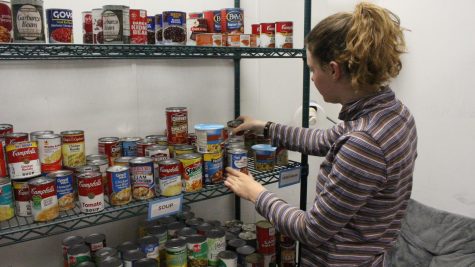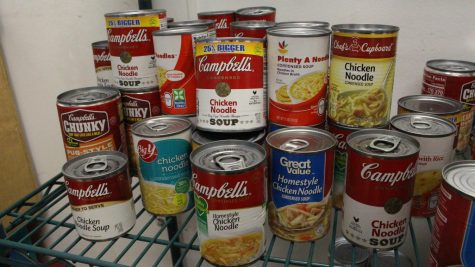UMass Student Food Pantry usage growing on campus despite No. 1 dining in the nation
Since opening in the fall semester of 2018, the food pantry has increasingly catered to the needs of graduate students.
April 23, 2019
Walk into the nondescript office space of 317C in Bartlett Hall and you’ll find shelves and boxes that line the walls stocked with donated Campbell’s canned goods, Kraft brand pasta, Goya beans and lots of snack foods. However, this seemingly obscure corner of campus at the University of Massachusetts Amherst plays a more important role than meets the eye.
The Princeton Review has ranked UMass No. 1 in college campus dining for three consecutive years. At the same time, the UMass Student Food Pantry, run by and for UMass students in 317C, has only had higher levels of usage since opening in the fall of 2018, leading to concerns about food insecurity on campus for the university’s most vulnerable populations.
“Food insecurity is a huge problem nationwide,” said Anna Drexler, a sophomore public health and women, gender and sexuality studies major. She is one of the 30 student co-organizers at the UMass Student Food Pantry and a member of Alpha Phi Omega, the national community service fraternity who founded the food pantry.
Drexler has seen the food pantry evolve from concept to present. After joining Greek life freshman year, she met a brother who shared an interest in food security and social justice.
“[He] had this idea to start a food pantry through APO in the old Student Union in our office,” said Drexler. “I was friends with him and immediately took to this idea and kind of was super interested in it, so I just did research and worked with him and helped start it through APO.”

Before the pantry opened, UMass students who lack reliable sources of food, or who are “food insecure,” had to rely on regional resources such as the Amherst Survival Center or the Food Bank of Western Massachusetts. Drexler explained that the campus food pantry was made to fill a void for a student-run and serviced facility without outside funding. She added that many other institutions of UMass’ size and caliber also have student-run pantries.
During its first semester in operation, clients used the pantry more infrequently, but “this semester it’s grown exponentially,” said Drexler.
In the first half of the spring semester of 2019, student usage has more than doubled, with over 150 visits compared to roughly 60 recorded visits to the pantry last semester. Drexler attributes this rise to the growing awareness of the pantry.
“There was also just increasing evidence that people on the UMass campus were struggling with food insecurity,” she said. “Particularly grad students were having this problem of not being able to afford food or maybe dropping off of the meal plans because of how UMass Dining is number one and it’s so expensive.”

She explained that for graduate students, food is often the first expense to go on the chopping block as these students are often more concerned with wages, demanding work hours, high rents and expenses other than nourishment.
While UMass Dining is ranked No. 1 nationally, it is not inexpensive. According to statistics from UMass Dining, for the 2018-2019 academic year, the average “DC Basic” plan costs $2,779 per semester with the most expensive and comprehensive plan being “Unlimited +” at $3,269. The cheapest meal plan, “YCMP On the Go!” is $800, but this plan only comes with $800 dining dollars and five meals in the dining commons.
While the identities of those who the pantry serves are protected under confidentiality, the demographics reveal some startling realities.
Of the clientele, the demographics reveal that 72 percent identified as female. The largest proportion of visitors in regard to race were Asian, at 40 percent. First-generation students also made up 48 percent of the clientele.
According to the UMass Office of Institutional Research, in the fall of 2018, the UMass student body consisted of just over 7,000 graduate students and almost 22,000 undergraduates. However, 58 percent of pantry clients were graduate students and only 42 percent were undergraduates.
Molly Hansen, a second-year master’s student in higher education administration, sees the issues that graduate students face firsthand. She pointed to rising tuition and costs of living in Amherst, particularly for graduate students with families, as primary concerns for this demographic.

While the pantry normally operates Monday to Thursday from 4 p.m. to 7 p.m., hours for all visitors are pushed to 10 a.m. to 2 p.m. on Fridays with the normal time slot being allotted specifically to graduate students. The designation is meant to accommodate the busy schedules of graduate students and acts as a buffer between graduate students, who may work in residential life or as teaching assistants, and students they potentially interact with.
Graduate students, typically older than undergraduate students, are more likely to have dependents, such as children, to care for while attending school. The pantry allows for students with dependents to take two additional items per dependent. However, since the pantry’s supplies are all donated, the number of items one can take in a visit varies depending on the quantity of stock.
According to Drexler, the pantry is always looking for donations of non-perishable food items.
“We’re most looking for pasta, pasta sauce, things that make a good dinner. We’re looking for baby food, and rice and beans are really big for people.”
She added that the shelves of the pantry are currently barer than in the past due to increased usage, causing concern for donation needs as usage continues to rise.
Drexler, who sits on the Student Government Association’s Administration and Finance Committee, is actively trying to solve this problem. She is currently working with Vice Chancellor Andrew Mangels and the head of UMass Dining to produce a basic meal plan that is more affordable and is hoping to roll out the new plan by the fall semester.

Hansen and Drexler both mentioned the idea of institutionalization of the food pantry, where there would be a transfer of power from students to the UMass administration. The benefits of such a move would guarantee stocked shelves and staffing to serve the facility, according to the two advocates.
Drexler, who has witnessed the pantry’s growth from its infancy, feels torn on the decision to institutionalize: “I feel sad that it’s maybe going to be taken, but at the same time, I know that’s what’s best for this pantry and what’s best for the people.”
Despite persistent issues of food insecurity on the UMass campus, “the ultimate goal overall is to not need a food pantry,” said Hansen.
Email Christopher at chrjmclaughl@umass.edu or follow him on Twitter @ChrisMcLJournal
